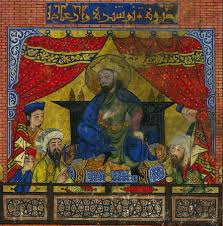
Source: en.wikipedia.org/wiki/Ancient_E…
For This Thread, Most Of This Is Information Is Going To Be Copied From Wikipedia And Pasted On Twitter For Those Who Want A Much Easier And Digestible Read
Ancient Egypt
From Wikipedia, the free encyclopedia
For This Thread, Most Of This Is Information Is Going To Be Copied From Wikipedia And Pasted On Twitter For Those Who Want A Much Easier And Digestible Read
Ancient Egypt
From Wikipedia, the free encyclopedia

Ancient Egypt was a civilization of ancient North Africa, concentrated along the lower reaches of the Nile River, situated in the place that is now the country Egypt.
Ancient Egyptian civilization followed prehistoric Egypt and coalesced around 3100 BC (according to conventional Egyptian chronology) with the political unification of Upper and Lower Egypt under Menes (often identified with Narmer).
The history of ancient Egypt occurred as a series of stable kingdoms, separated by periods of relative instability known as Intermediate Periods: the Old Kingdom of the Early Bronze Age, the Middle Kingdom of the Middle Bronze Age, and the New Kingdom of the Late Bronze Age.
Egypt reached the pinnacle of its power in the New Kingdom, ruling much of Nubia and a sizable portion of the Near East, after which it entered a period of slow decline.
During the course of its history, Egypt was invaded or conquered by a number of foreign powers, including the Hyksos, the Libyans, the Nubians, the Assyrians, the Achaemenid Persians, and the Macedonians under the command of Alexander the Great.
The Greek Ptolemaic Kingdom, formed in the aftermath of Alexander's death, ruled Egypt until 30 BC, when, under Cleopatra, it fell to the Roman Empire and became a Roman province.
The success of ancient Egyptian civilization came partly from its ability to adapt to the conditions of the Nile River valley for agriculture.
The predictable flooding and controlled irrigation of the fertile valley produced surplus crops, which supported a more dense population, and social development and culture.
With resources to spare, the administration sponsored mineral exploitation of the valley and surrounding desert regions, the early development of an independent writing system,
the organization of collective construction and agricultural projects, trade with surrounding regions, and a military intended to assert Egyptian dominance.
Motivating and organizing these activities was a bureaucracy of elite scribes, religious leaders, and administrators under the control of a pharaoh, who ensured the cooperation and unity of the Egyptian people in the context of an elaborate system of religious beliefs.
Less of ancient Egyptian civilization came partly from its ability to adapt to the conditions of the Nile River valley for agriculture.
The predictable flooding and controlled irrigation of the fertile valley produced surplus crops, which supported a more dense population, and social development and culture.
With resources to spare, the administration sponsored mineral exploitation of the valley and surrounding desert regions, the early development of an independent writing system,
the organization of collective construction and agricultural projects, trade with surrounding regions, and a military intended to assert Egyptian dominance.
Motivating and organizing these activities was a bureaucracy of elite scribes, religious leaders, and administrators under the control of a pharaoh, who ensured the cooperation and unity of the Egyptian people in the context of an elaborate system of religious beliefs.
The many achievements of the ancient Egyptians include the quarrying, surveying, and construction techniques that supported the building of monumental pyramids, temples, and obelisks;
a system of mathematics, a practical and effective system of medicine, irrigation systems, and agricultural production techniques, the first known planked boats,
Egyptian faience and glass technology, new forms of literature, and the earliest known peace treaty made with the Hittites.
Ancient Egypt has left a lasting legacy. Its art and architecture were widely copied, and its antiquities carried off to far corners of the world. Its monumental ruins have inspired the imaginations of travelers and writers for centuries.
A newfound respect for antiquities and excavations in the early modern period by Europeans and Egyptians led to the scientific investigation of Egyptian civilization and a greater appreciation of its cultural legacy.
Ancient Egypt
Early Dynastic Period - 3150–2686 BC
Old Kingdom - 2686–2181 BC
1st Intermediate Period - 2181–2055 BC
Middle Kingdom - 2055–1650 BC
2nd Intermediate Period - 1650–1550 BC
New Kingdom -1550–1069 BC
3rd Intermediate Period - 1069–664 BC
Late Period - 664–332 BC



Early Dynastic Period - 3150–2686 BC
Old Kingdom - 2686–2181 BC
1st Intermediate Period - 2181–2055 BC
Middle Kingdom - 2055–1650 BC
2nd Intermediate Period - 1650–1550 BC
New Kingdom -1550–1069 BC
3rd Intermediate Period - 1069–664 BC
Late Period - 664–332 BC




Greco-Roman Egypt
Argead and Ptolemaic dynasties - 332–30 BC
Roman and Byzantine Egypt - 30 BC–641 AD
Sasanian Egypt - 619–628



Argead and Ptolemaic dynasties - 332–30 BC
Roman and Byzantine Egypt - 30 BC–641 AD
Sasanian Egypt - 619–628




• • •
Missing some Tweet in this thread? You can try to
force a refresh







